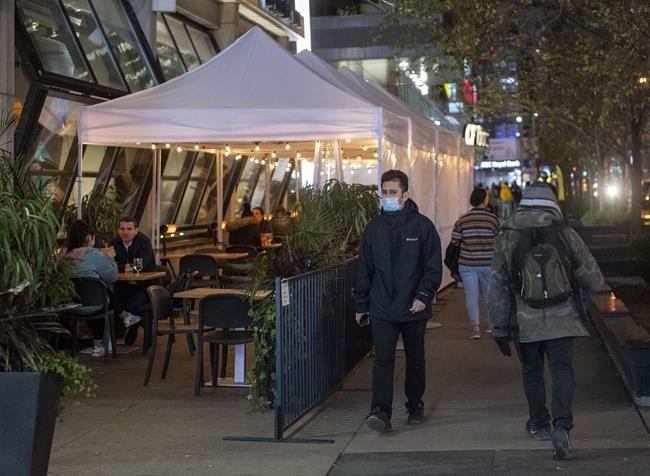TORONTO — Pub manager Crystal Meikle is used to pivoting with the shifting rules for businesses during the COVID-19 pandemic.
But Ontario’s proof-of-vaccination policy, set to take effect on Wednesday, treads into new territory, she said, since workers will be tasked with asking customers to show they are immunized against the virus.
“The pushback is where I get a little nervous,” Meikle said on a recent afternoon shift at the Queen’s Head pub in east Toronto. “It’s the unknown of how somebody is going to react.”
Last week the province outlined its guidelines for businesses required to make the checks. Patrons at dine-in restaurants, nightclubs, gyms, sports facilities and other venues must present a receipt of full vaccination and identification. Doctors’ notes for medical exemptions will also be accepted.
Fines are on the table for businesses that don’t comply with the checks and for patrons who give false information. But businesses, by-law officers, police forces and the province say enforcement will be gentle until the policy’s impact starts to play out on the ground – with much of the heavy lifting falling to businesses’ frontline staff.
Several Ontario police forces contacted by The Canadian Press indicated they would respond to safety-related calls regarding threats or violence but would not actively enforce or check for compliance with the vaccination policy.
A spokesman for Ontario's Solicitor General said the province doesn’t expect police to conduct “routine compliance checks” of the vaccination receipts.
Joe Couto, communications director with the Ontario Association of Chiefs of Police, said police forces would wait for calls to come in related to the policy before deciding whether to redeploy or adjust resources.
“The question I've been asked is, are police going to be needing new resources or shifting resources to deal with the rollout of certification,” he said. “The short answer to that is, we really don't know, because the province is still developing not only its policies, but how it will actually practically work.”
By-law officers will likely be the enforcement body responsible for issuing non-compliance tickets. In Toronto, the city said it would take an “educational approach” with businesses as the new rules roll out. It asked people to be respectful and to call 311 with non-compliance concerns.
A Ministry of Labour spokeswoman said inspectors would also be visiting affected settings, "taking an education first approach to help workers and the public stay safe and keep businesses open."
On the ground, businesses spent last week sorting out how they would assign staff to the task of checking for immunization status.
Venues that sell alcohol are used to checking IDs, but pub manager Meikle said the vaccine receipt requirement might take some getting used to for staff and customers.
She said the job may fall to employees who greet people in different sections like at the bar or as customers arrive to be seated.
People will need to show paper or digital vaccination receipts until next month, when the province has promised a QR code with individuals' vaccination records and an app for businesses to verify them -- something Meikle said she wished had been ready for the policy's launch.
"I think it would be a lot easier and helpful for us to manage," she said of the QR code.
Gavin Holmes, owner of Jio Rana’s restaurant, said hosting staff would be checking for vaccination proof.
It’s the latest additional task for staff to take on during the pandemic, but Holmes said a staffing shortage in the industry makes it difficult to bring more people onto shifts.
“Employing somebody else would be great, but it just isn't feasible right now,” he said in the dining room of his Toronto establishment.
He said his business intends to comply with what's expected.
“We’re just basically taking it all in our stride,” he said. “We fully support what we have to do so long as we can stay open.”
The staffing juggle required will play out differently depending on the business type.
Restaurants Canada vice president James Rilett said some quick service establishments that typically don’t have someone working at the door are considering bringing another staff member on each shift to check proof of vaccination.
Those that can’t afford it are considering not opening their dining rooms at all, he said, adding that the considerations are tough for restaurants already struggling with finances after a year of on-and-off closures.
“They can't afford it, but they really can't afford to not be open either,” Rilett said by phone.
Health Minister Christine Elliott and Toronto mayor John Tory have both said they don't expect non-compliance to be a major issue.
Meikle said she's hopeful patrons at her pub will respond well, as they have to previous rule changes. But she said the sensitive topic of vaccination will be a new conversation with many regular customers.
“I guess we'll cross that bridge when we come to it," she said.
This report by The Canadian Press was first published Sept. 19, 2021.
Holly McKenzie-Sutter, The Canadian Press

